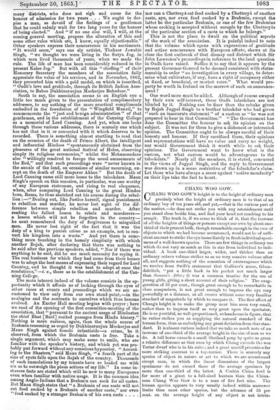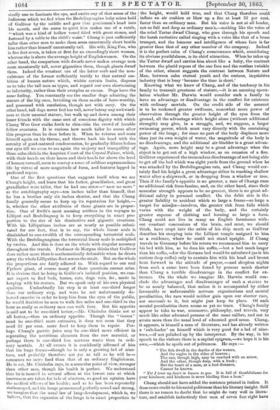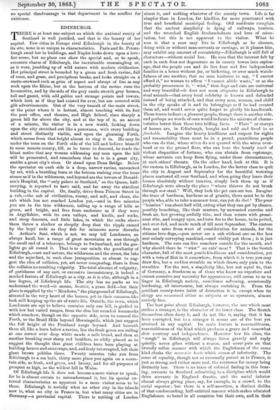CHANG WOO GOW.
CHANG WOO GOW'S height is to the height of ordinary men precisely what the height of ordinary men is to that of an ordinary boy of ten years old, and yet,—that is the curious part of
the matter,—he does not strike you with any astonishment until you stand close beside him, and find your head not reaching to his armpit. The truth is, if we come to think of it, that the increase
of all the heights of things or persons except our own by about one- third of their present bulk, though remarkable enough in the case of objects to which we had become accustomed, would not be of suffi- cient amount to strike the eye immediately in fresh individual speci- mens of a well-known species. There are few things in ordinary use which do not vary as much as this in size from individual to indi- vidual. A book one-third larger, wider, and thicker than an ordinary octavo volume strikes us as no very massive volume after all, and suggests nothing of the sensation of extravagance which we receive from Swift's statement that Gulliver's nurse, Glum- dalclitch, "put a little book in his pocket not much larger than Samson's Atlas; it was a common treatise for the use of young girls, giving a short account of their religion." The exag- geration of 33 per cent., though great enough to be remarkable in close comparison, is not great enough to impress the eye very powerfully at a distance, at all events without some very familiar standard of magnitude by which to compare it. The first effect of Chang's height is to make the group near him seem very small, rather than to impress itself as very great upon the spectator. He is so youthful, so well-proportioned, so handsome in figure, that he rather strikes you as supplying the natural standard of the human form, than as embodying any great deviation from that stan- dard. It is almost curious indeed that we take so much note of an increase of one-third of the average height in the size of men as we do. A tall horse exceeds a small Shetland pony by quite as great a relative difference as that even by which Chang exceeds the wee Tartar dwarf who is in his suite ; and a great mastiff presents a far more striking contrast to a toy-terrier. There is scarcely any species of object in nature or art to which we are accustomed except man, in which the linear dimensions of the largest specimens • do not exceed those of the average specimen by more than one-third of the latter. A Cochin China fowl is far more of a giant to a full-sized bantam than the China- man Chang Woo Gow is to a man of five feet nine. The human species appears to vary usually indeed within narrower limits than most other species, but the advance of 33 per cent. on the average height of any object is not intrin-
sically one to fascinate the eye, and excite any of that sense of the ludicrous which we feel when the Brobdingnagian baby seizes hold of Gulliver by the middle and gets that gentleman's head into his mouth, and the nurse to quiet him makes use of a rattle, "which was a kind of hollow vessel filled with great stones, and fastened by a cable to the child's waist." Chang is just sufficiently taller than other men to make them seem unnaturally short beside him rather than himself unnaturally tall. His wife, King Foo, who is five feet seven, is taken at first for an exceedingly short woman, whereas she is above the average height of Englishwomen. On the other hand, the comparison with dwarfs never makes average men seem unnaturally tall, never gigantizes them, though giants dwarf them. Indeed the constant use of the latter verb and the non- existence of the former sufficiently testify to that natural am- bition of human nature which, within certain limits, disposes us to take the tall men as types, and regard our own shortcoming as inferiority, rather than their overplus as excess. Dogs have the same feeling. You constantly see the smaller dogs admiring the stature of the big ones, lavishing on them marks of hero-worship, and possessed with emulation, though not with envy. On the other hand, tall dogs never feel too tall, never betray any awkward- ness at their unusual stature, but walk up and down among their lesser friends with the same sort of conscious dignity with which Chang Woo Go w stalks forth to chin-chin the crowd of humble fellow creatures. It is curious how much taller he seems after this progress than he does before it. When he returns and seats himself again on his throne, and throws back his head with the serenity of good-natured condescension, he gradually dilates before our eyes till we seem to see again the majesty and tranquillity of those calm idols in the Assyrian Court of the Crystal Palace, which, with their hands on their knees and their heads far above the level of human turmoil, seem to convey a sense of sublime supramundane life by virtue of mere magnitude of form, and features lapped in profound repose.
One of the first questions that suggests itself when we see Chang's height, and learn that his father, grandfather, and great grandfather were taller, that he had one sister—" now no more" as the autobiography says—ten inches taller than himself, that he has a brother only six inches shorter, and that the Chang family generally seems to keep up its reputation for height,— is, whether the other attributes of these giants are in propor- tion. One of Swift's most amusing artifices in the voyages to Lilliput and Brobdingnag is to keep everything in exact pro- portion to the size of his diminutive and gigantic creations. With his Lilliputians inches are as nearly as possible substi- tuted for our feet, that is to say, the whole linear scale is diminished to one-twelfth of the corresponding terrestrial scale. With the Brobdingnagians the terrestrial linear scale is multiplied by twelve. And this is done on the whole with singular accuracy throughout the travels. Professor de Morgan thinks that Gulliver does rather more than is mathematically defensible when he draws away the whole Lilliputian fleet across the strait. But on the whole the proportions are fairly adhered to. With regard to our real Fychow giant, of course many of these questions cannot arise. It is obvious that he being in Gulliver's isolated position, we can- not expect to find beds, horses, cats, dogs, rats, &c., made in keeping with his stature. But we speak only of his own physical qualities. Undoubtedly his step is at least one-third longer than our ordinary step, and were he not unfortunately de- barred exercise in order to keep him from the eyes of the public, he would doubtless be seen to walk five miles and one-third in the hour as easily as ordinary men can walk four. But his appetite is said not to be one-third better,—Mr. Chisholm thinks not at all better,—than an ordinary appetite. Though the " tissues" must be one-third more extensive, it does not seem that they need 33 per cent. more food to keep them in repair. Per- haps Chang's gastric juice may be one-third more efficient in separating the nutritious elements from the raw material, or perhaps there is one-third lees nervous waste than in ordi- nary mortals. At all events it is confidently affirmed of him that his huge frame—though he is only a growing lad of nine- teen, and probably therefore not yet as tall as he will be— consumes no more food than that of an ordinary Englishman. He is not, Mr. Chisholm says, in a muscular point of view, stronger than other men, though his health is perfect. We understand that he is insured in several offices at the lowest rate at which insurances are taken for lads of nineteen, so good an opinion have the medical officers of his health ; and as he has been repeatedly stethescoped, and his lungs pronounced perfectly sound and strong, we imagine that the usual law of lung-development, which is, we believe, that the expansion of the lungs is in exact proportion to the height, would hold true, and that Chang therefore could inflate an air cushion or blow up a fire at least 33 per cent. faster than an ordinary man. But his voice is not at all louder, not so full and deep as ordinary men's,—nothing like the voice of the rebel Tartar dwarf Chung, who goes through his speech and the harsh recitative called singing with a voice like that of a brass trumpet, and the humour and intelligence of whose face is far greater than that of any other member of the company. Indeed it is the perfect calm of Chang's countenance which, considering its obvious youthfulness, is its chief attraction. When he takes up the Tartar dwarf and carries him about like a baby, the contrast between the placid repose of the one face and the restless twinkle of the other, almost suggests the contrast between Nature and Man, between calm eternal youth and the curious, inquisitive industry that is busy ' because the time is short.'
Knowing what we know of Chang, and of the tendency in his family to transmit greatness of stature,—it is an amusing specu- lation whether Mr. Darwin would consider each a family to have an advantage or disadvantage in the conflict for existence with ordinary mortals. On the credit side of the account is to be reckoned greater swiftness, somewhat more power of observation through the greater height of the eyes from the ground, all the advantage which height alone (without additional strength) may give, in a struggle, and, we suppose, a larger swimming power, which must vary directly with the containing power of the lungs ; for since no part of the body displaces more than just its own weight of water, the magnitude of the body is no disadvantage, and the additional air-bladder is a great advan- tage. Again, mere height may be a great advantage when the object is to get out of a high window, as on occasion of a fire. Gulliver experienced the tremendous disadvantage of not being able to get off the bed which was eight yards from the ground when he was attacked by the Brobdingnagian rats, and Chang would cer- tainly find his height a great advantage either in reaching shallow water after a shipwreck, or in dropping from a window or tree. Then if the family's appetite is no greater, a race of Change runs no additional risk from famine, and, on the other hand, since their muscular strength appears to be no greater, there is no great ad- ditional safety in personal conflict. On 'the debit side is the greater liability to accident which so large a frame—so large a target for missiles—involves, the greater risk from falls which varies with the weight of the body, and the certainly greater expense of clothing and housing so large a form. Chang could not live in many an English farmhouse with- out constant concussions of the brain, and must, we should think, have crept into the cabin of his ship much as Gulliver describes his creeping into the Lilliput temple assigned to him as a residence, where he could not stand upright. If Chang travels in Germany before his return we recommend him to carry his bed with him, as he does his coffin,—but a bed much longer than his coffin, —for the German bed would be calculated (as is his curious deep coffin) only to contain him with his head and breast bent forward in the attitude of prayer, —and sleepless nights from such a cause have been found by persons much shorter than Chang a terrible disadvantage in the conflict for ex- istence. On the whole we imagine Mr. Darwin would con- clude the advantages and disadvantages of such a stature to be so nearly balanced, that unless it is accompanied by either favourable or unfavourable nervous organizations and mental peculiarities, the race would neither gain upon our shorter race, nor succumb to it, but might just keep its place. Of such mental peculiarities there seems as yet no trace. Chang's family appear to take to war, commerce, philosophy, and travels, very much like other educated persons of the same calibre, and not to attain more than the usual level of educated good sense. Chang, it appears, is himself a man of literature, and has already written a 'sub-leader' on himself which is very good for a lad of nine- tee u,—if not polished up by the interpreter. By the way, in his speech to the visitors there is a capital epigram,—we hope it is his own,—which he spoils out of politeness. He says :- " The fish dwell in the depths of the waters,
And the eagles in the sides of heaven ; The one, though high, may be reached with an arrow,
And the other, though deep, with a hook ;
But the heart of a man, at a foot distance, Cannot be known.
" Yet 1 trust my heart is known to you. It is full of thankfulness for
your kindness, and kindness is more binding than a loan."
Chang should not have added the sentence printed in italics. It does more credit to his social politeness than his literary insight. Still there is no reason to doubt that he might do very well in litera- ture, and establish inductively that men of seven feet eight have no special disadvantage in that department in the conflict for existence.
































 Previous page
Previous page